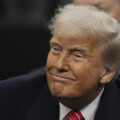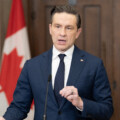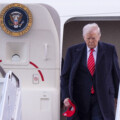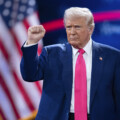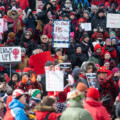Last week, Canada followed the lead of the United States and the European Union by imposing a 100 percent tariff on Chinese-manufactured electric vehicles (EV), along with 25 percent tariffs on Chinese aluminum and steel.
The tariff announcement comes as Chinese EV imports into Canada may soon surpass that of the United States, experts have told The Hub. The consequences, including for the Trudeau government’s 100 percent zero-emission vehicle (ZEV) mandate, could be significant.
Between 2022 and 2023, the value of passenger EVs imported from China grew from just $84 million to $2.2 billion.
Over the same timeframe, the value of EVs imported from the United States shrunk by over $2 billion, from $4.8 billion to $2.7 billion. As of 2023, American EV imports are still greater than those of China. But the value of its imports relative to China’s fell from $4.7 billion to just $573 million over the course of the year.
The value of Canada’s EV imports from all other countries rose by $2 billion in these years. Imports from Canada’s next greatest suppliers, South Korea and Germany, rose from $730 million and $317 million to just $1.2 billion and $820 million, respectively.
It’s highly likely that without Canada’s new EV tariff, China’s low costs and high production output would have seen Chinese EV imports surpass U.S. imports, Moshe Lander, senior economics lecturer at Concordia University, told The Hub.
China’s EV advantage is evident when it is compared to the history of America’s broader automotive industry, said Lander.
“What (China) realised was, rather than trying to fight last century’s automobile battle, let’s fight this century’s automobile battle.” China’s lack of a global combustion-engine vehicle industry allowed it to instead hyperfocus on building and exporting EVs. By 2030 their domestic vehicle sales could be more than 50 percent battery electric, two years ahead of previous forecasts.
As a result, China has just achieved “hockey stick-style growth” in its EV imports into Canada which reflects its flat to rapid growth, resembling the stark curve of a hockey stick, said Lander.
This progress is due to several factors, including relatively low labour costs, hundreds of billions of dollars in direct and indirect subsidies, and China’s growing dominance and protection of the EV materials supply chain. The result is to significantly lower the Chinese EV sector’s fixed costs.
“Once you start to achieve scale–you get to the millionth vehicle or ten millionth vehicle–the cost (of EV production) starts to drop rapidly because you can spread that billion-dollar factory cost over more and more units. As cost comes down, the ability to capture market share from those that haven’t reached that scale…becomes reinforcing. They gain more scale and get more sales, so they gain more scale,” said Lander.
These underlying factors as well as EV giant Tesla’s recent move to manufacture in Shanghai, China have contributed to Canada’s increase in EV imports from China and the decline of those from the U.S.
Yet, in the old battle for Canada’s combustion-engine market share, American imports still hold a peerless position.
In 2023, the value of imported U.S. passenger motor vehicles (excluding EVs) was 41 percent of Canada’s total from around the world. China’s share was just 5 percent.
As for EVs, Canada’s tariffs are aimed at creating policy alignment with the U.S. given the integration of our auto sector, Vina Nadjibulla, the vice president of research and strategy at the Asia Pacific Foundation of Canada, told The Hub.
In the short term, the impact of Canada’s tariffs on Chinese EVs is likely to be minimal, said Nadjibulla. In 2023, all EV imports from China were Tesla models manufactured in Tesla's Shanghai factory, she said. “To avoid these tariffs in the U.S. and Canada, Tesla will likely change its supply routes. Therefore, the immediate impact on Canadian consumers is limited.”
As of Q2 2024, the latest reported, Tesla’s annual manufacturing production reached 950,000 in Shanghai. That rose from 2017’s 450,000 to surpass Tesla’s U.S. production capacity, now the largest anywhere in the world, according to their financial statements. The company’s U.S.-based facilities in California and Texas have an annual production capacity of 900,000 units. Its German manufacturing capacity falls well behind, with just 375,000 vehicles per year.
If China were to set up EV manufacture and export shops in Mexico meanwhile, utilising trade rules of the U.S.-Mexico-Canada Agreement, it would be an “extinction-level event” for the U.S. automotive industry and should compel their government to pressure Mexico for national security’s sake, U.S. automakers have said.
In the longer term, Canada’s tariffs on Chinese EV imports could make it harder to meet the Trudeau government’s mandate of having all cars sold be ZEVs by 2035, said Nadjibulla.
In 2023, ZEVs (which include battery electric and plug-in hybrid electric vehicles, by Statistics Canada’s definition) were 14.76 percent of new vehicles registered. (Statistics Canada’s count of “new vehicles registered” includes first-time vehicle registrations from the previous, current, or next model year, and are commonly used to represent vehicle sales.)
Based on the average growth of ZEV share from 2021 to 2023—14.1 percent—it's projected that by 2026 Canada will meet that year’s ZEV sales target, of 20 percent.
However, by 2035, ZEVs are projected to account for just 71 percent of all new vehicles in Canada, and by 2030 just 37 percent (below 2030’s 60 percent goal). To reach 100 percent of all Canadian vehicle sales by 2035, ZEVs’ share of new sales must experience an average annual growth of at least 17 percent.
“Depending on how quickly Canadian and U.S. automakers can ramp up [EV] production—a significant uncertainty—Canadians will likely end up with fewer choices and higher prices for EVs in the medium term,” said Nadjibulla.
When large open economies like the U.S. or E.U. impose Chinese EV tariffs, Chinese manufacturers must reduce their EV prices by some portion of the tariff to maintain a share of their larger markets.
This is not the case for Canada’s smaller consumer market. “We’re just not big enough to throw our weight around that way,” said Lander. “When we’re looking at the E.U. or the U.S. saying ‘maybe we should try (an EV tariff) here’...the impacts are going to be different.”
Canada’s few EV manufacturers could raise their own prices to match the higher prices of Chinese EVs, the result of Canada's EV tariff, he said, adding that small open economies such as Canada should thus apply additional caution when considering tariffs.



